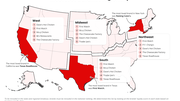News
11% mortality rate of cage-free hens not solely due to cage-free housing, WAP says
By going cage-free, food businesses can also stay at the forefront of market trends, since several major corporations – including Burger King, Starbucks, Aramark, and Unilever – have proactively committed to transition to sourcing only cage-free eggs over the next several years.
March 26, 2015
World Animal Protection issued the following statement today on the Coalition for Sustainable Egg Supply's final research results, released last week. CSES's research examined conventional cage, enriched colony cag, and cage-free housing systems for laying hens and analyzed the performance of two hen flocks in each system over a three-year period. CSES research looks at the potential impacts on sustainability measures, including hen welfare and food safety, of the three housing systems.
Dr. Priya Motupalli, animal welfare specialist at World Animal Protection, said in the statement, "In general, CSES's study achieved what it set out to accomplish. It illustrates the trade-offs of each housing system, and suggests that further research is necessary to help mitigate some of these trade-offs.
"It is important to note, however, that this research does not recommend one type of housing system over another, and the study's authors themselves caution that it reflects only a 'snapshot' in time. In light of this and other factors detailed below, we believe that the farming industry and businesses should not use this study as their sole reference point for making decisions regarding housing systems for laying hens. Several factors inform this:
- This study's results are based on data from only two flocks, meaning that this sample size, while informative, is not sufficient for definitive conclusions.
- This research notes that hen performance and health were improved from the first to the second flock in part due to farm management being refined as workers gained experience over time. This indicates that it's unlikely that these study results accurately reflect how well cage-free systems perform for experienced farmers.
- The Big Dutchman aviary system, which the study used for its cage-free analysis, is only one type of cage-free system. Big Dutchman alone provides multiple aviary systems, and the study did not consider the variety of cage-free systems available, such as those offering access to the outdoors. We appreciate that it may have been beyond the scope of the study design to do so, but these research results cannot be extrapolated to cage-free systems in general.
- There have been significant improvements to the technology of cage-free systems since this research began.
- It also cannot be concluded that that the mortality rate of hens observed (11 percent) in the cage-free systems is solely due to cage-free housing, since there are so many other factors at play here, including farm worker experience with the cage-free system and the specific sub-type of hen used. Hen type has been shown to affect success in different housing systems, with many factors being influenced including appropriate nest box use, egg microbial levels, and cannibalism. This indicates that it is unlikely that one hen type would be suitable for three systems that differ greatly in levels of complexity.
"Despite these caveats, this research is exciting in that it provides us with an excellent opportunity to innovate to improve cage-free production systems. It is also convenient that this research mirrors many of the findings of extensive European research (LayWel, 2006), conducted in preparation for the European Union's ban on conventional cage housing for hens, which came into effect in 2012. This means we can draw on existing learnings to help ensure optimal hen welfare in the United States.
"The CSES's research also found that hens reared in cage-free systems had better wing and leg health compared to hens placed in both enriched and conventional cages and that cage-free hens were much better able to perform their natural behaviors, such as foraging and dust-bathing. Cage-free hens were even observed to cluster in large groups (>200) on the litter floor and sometimes spent up to six hours in this manner!"
Kara Mergl, World Animal Protection's U.S. manager of corporate engagement, said in the statement, "By going cage-free, food businesses can also stay at the forefront of market trends, since several major corporations – including Burger King, Starbucks, Aramark, and Unilever – have proactively committed to transition to sourcing only cage-free eggs over the next several years. Research has also shown that influential market segments, including mothers and millennials, consider animal welfare in their food purchasing decisions, meaning that food businesses that sell eggs from successfully managed cage-free housing systems will be more favorable to these market segments."












